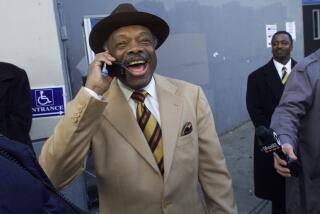Brown Charges That Inquiries Are Racially Motivated
SACRAMENTO — An emotional Assembly Speaker Willie Brown fended off persistent questions about his private law practice Tuesday by charging that scrutiny directed at him is racially motivated.
“It’s tough being black, mister, it really is,” Brown said at a press conference, insisting that he has been a subject of inquiry by reporters and federal investigators because he is black, successful and a Democrat.
Brown made the comments partly in response to an article Monday in The Times that detailed how he entangled his public duties with the interests of his private clients. He had refused to be interviewed for the article.
On Tuesday, Brown responded to disclosures about his work on behalf of British American Tobacco, which has extensive operations in South Africa. Brown had led the charge in the 1980s to force the state to pull investments out of firms that do business in that country because of its apartheid policies.
“I use my own discretion and my own circumstances to make my determination of what I do--period,” Brown said. “I don’t use your standards. I don’t use anybody else’s standards. I use my standards--and you are entitled to criticize me for my standards.”
Brown represented British American Tobacco in 1988 and 1989, helping it in its takeover of Farmers Group insurance of Los Angeles. BAT’s U.S. subsidiaries also paid his way to the 1989 and 1990 Kentucky Derbys.
Brown said he is not bothered by BAT’s refusal to sign a statement pledging that it will not discriminate against its black workers in South Africa--”just like it did not bother me that most of you have a level of racism that is so subtle that visits itself every day of my life upon me and other black Americans.”
“I don’t reject you because of that,” Brown said. “I understand the reality of dealing with those things which you can deal with. Period. I do it and I do it effectively. Period.”
Brown shrugged off charges by former acting Treasurer Elizabeth Whitney, who told The Times and the FBI that the Speaker asked her in 1985 and 1987 to help give bond business to a former client, Grigsby Brandford & Associates, a San Francisco investment banking house.
“My conduct has always been above reproach in dealing with any other agency of state government,” Brown said. “Had it not been so, you know . . . that I would have long since been nailed.”
The Speaker, whose annual salary last year rose to $63,000, again said he would support a ban on outside employment if the pay of legislators is increased. He noted that his efforts to win passage of such legislation have failed, adding, “That is tragic.”
During the decade he has been Speaker, Brown reported receiving at least $1.4 million in legal fees, plus more than $500,000 in speaking fees. That is more than five times what he was paid as Speaker. Under state law he must list clients who pay more than $10,000 a year, but he does not have to say how much more they pay him.
On Tuesday, he refused to say how much he earned from his law practice. Brown sarcastically said he was “embarrassed” that the figure cited by The Times was so low. “No way that you should be that unsuccessful,” he said.
Brown’s private practice has received increased press attention in recent months because one of his former clients, Norcal Solid Waste Systems, a San Francisco garbage firm, is a target of a federal investigation over conduct that occurred when Brown was on its payroll.
Brown said that he is not a target of the FBI investigation, but maintained that racial minorities who hold public office become the focus of a disproportionate share of criminal investigations.
When asked whether he would escape close scrutiny were he not black, Brown said: “Absolutely. Absolutely. Absolutely.
“Maybe the title of Speaker prompts it. But in part you and I know it has something to do with the color of my skin and the success which I allegedly enjoy,” Brown said.
As Speaker, Brown has more power than other Assembly members. He assigns colleagues to committees, controls the fate of much legislation and appoints constituents to state commissions.
He insisted that the focus on his conduct is a product of racial bias.
“You are held accountable, unlike your white counterpart standing right next to you,” Brown said. “It is unfair, but you know there is nothing you can do about it. You have got to tolerate it. And for probably as long as you have been alive, if you have enjoyed any degree of success as a racial minority, particularly a black, you have to adjust to that--and, man, that is a real tough duty.”
More to Read
Get the L.A. Times Politics newsletter
Deeply reported insights into legislation, politics and policy from Sacramento, Washington and beyond. In your inbox three times per week.
You may occasionally receive promotional content from the Los Angeles Times.










